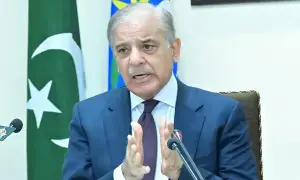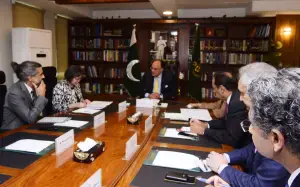How U.S. tariff against Pakistani exports violates WTO and global trade regulations
4 min readPakistan has yet to issue an official response, but experts and analysts have strongly condemned the United States’ unilateral imposition of a 29% tariff on Pakistani exports, arguing that the move violates World Trade Organization (WTO) rules and other global trade regulations.
The experts stress that the tariffs misrepresent Pakistan’s trade framework and are inconsistent with international law.
In response to the 29% tariff imposed by the United States on Pakistani exports, the federal government has launched a comprehensive strategy aimed at protecting national trade interests and minimizing the economic impact.
Prime Minister Shehbaz Sharif has constituted a high-level steering committee and a specialized working group to address the issue through diplomatic and economic channels.
U.S. tariff violates WTO principles
Trade experts have pointed out that Pakistan’s tariff policies are fully in line with the rights of developing nations as defined by the WTO. Under WTO rules, developing economies are permitted to implement tariffs to protect their nascent industries during the economic development process. According to these experts, Pakistan’s tariff structure is legitimate and complies with international trade standards.
The imposition of the 29% tariff by the U.S. is seen as a violation of WTO principles, particularly the organization’s rules on non-discrimination and fairness. These principles dictate that trade disputes should be resolved through multilateral negotiations rather than unilateral actions, as the U.S. has done. The move is viewed as an unfair escalation of trade tensions, one that disregards the established mechanisms for resolving such issues.
Unilateral tariffs undermine global trade stability
Analysts warn that actions like the U.S. tariff could destabilize the multilateral trading system. The WTO framework is designed to prevent such unilateral measures that can trigger trade wars and disrupt international trade order. By imposing these tariffs without following the WTO’s dispute resolution processes, the U.S. risks undermining the integrity of global trade rules.
These punitive tariffs are seen as harmful not only to Pakistan but to the broader global trade environment, setting a dangerous precedent for future trade relations. Experts argue that global stability depends on the continued adherence to a rules-based system that prevents unilateral actions from dominating the landscape.
Need for diplomacy and adherence to international norms
Trade observers suggest that Pakistan will likely challenge the tariffs through the WTO’s dispute settlement mechanism, given the serious violations of global trade law. Diplomatic solutions and negotiations are encouraged as the most effective means to resolve trade disputes, as opposed to retaliatory tariff measures.
Impact on developing economies and global trade fairness
The U.S. tariff not only violates WTO regulations but also threatens the principles of fairness in global trade. Experts emphasize that developing nations like Pakistan should be afforded equitable treatment under international trade frameworks, which recognize their need to protect emerging industries. The imposition of such tariffs undermines the developmental rights of countries seeking to enhance their economic standing in the global market.
Government response
Prime Minister Shehbaz Sharif, recognizing the gravity of the situation, has appointed Finance Minister Muhammad Aurangzeb to lead a 12-member steering committee tasked with negotiating with U.S. authorities and protecting Pakistan’s trade interests. The committee includes key figures such as the federal ministers for commerce and petroleum, the chairman of the Federal Board of Revenue (FBR), and Pakistan’s ambassador to the U.S., among others.
The steering committee will be responsible for overseeing the entire process, ensuring that Pakistan’s legal, diplomatic, and economic strategies are aligned with international standards. Regular updates on the committee’s progress will be provided to the prime minister. Working group to provide technical and strategic expertise
Alongside the steering committee, a 19-member working group has been formed to provide in-depth analysis and strategic recommendations. The working group, convened by Commerce Secretary Jawad Paul, includes federal secretaries, prominent business leaders, and experts in trade and economics.
The working group’s key responsibilities include analyzing the impact of the U.S. tariffs on Pakistani exports, identifying alternative trade opportunities, and formulating policy recommendations to mitigate the economic damage. Real-time data will be used to assess the sectors most affected by the tariff, allowing for targeted interventions to support vulnerable industries.
For the latest news, follow us on Twitter @Aaj_Urdu. We are also on Facebook, Instagram and YouTube.



























Comments are closed on this story.